Australia Fires: Rescue dog Bear saves scores of koalas
Date – 16/05/2020
Author / Reference – Isabelle Rodd
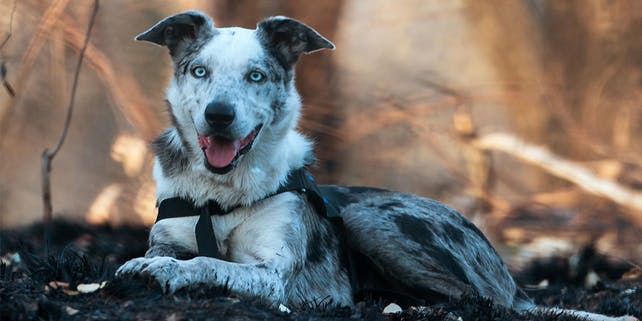
An Australian Koolie dog who was abandoned by his family has been rescued and retrained to detect koalas.
Bear has been following the aftermath of Australia’s bushfires since January, finding sick, injured or starving koalas that otherwise would have perished. He has now found more than 100.
India coronavirus: Can the Covid-19 lockdown spark a clean air movement?
Date – 22/04/2020
Author / Reference –

When India shut down last month and suspended all transport to contain the spread of coronavirus, the skies over its polluted cities quickly turned an azure blue, and the air, unusually fresh.
As air pollution plummeted to levels unseen in living memory, people shared pictures of spotless skies and even Himalayan peaks from cities where the view had been obscured by fog for decades.
On one social messaging group, a resident of the capital, Delhi, which regularly records some of the foulest air in the world, celebrated the city’s “alpine weather”. Politician and author Shashi Tharoor wrote that the “blissful sight of blue skies and the joy of breathing clean air provides just the contrast to illustrate what we are doing to ourselves the rest of the time”.
Coronavirus: ‘My housemate refuses to social distance’
Date – 22/04/2020
Author / Reference – Manish Pandey

Having difficult housemates is something a lot of us have probably experienced at some point.
But with the government telling us to stay inside because of coronavirus, it’s not the best time to have a housemate who breaks the rules.
“He doesn’t seem to think having people over is a problem,” Helen* tells Radio 1 Newsbeat about the man she lives with, who’s also her landlord.
She says he’s not been following any of the government rules regarding social distancing and staying inside during lockdown.
“He’s been bringing multiple women over and there’s no such thing as social distancing for him,” she says.
Because of the number of people visiting her home, Helen is worried about the risk to her health.
“We know the virus lives on surfaces for a long time. So if they’ve used something and not washed it properly, it exposes the entire apartment to the virus.”
She now stays isolated in her room because she feels it’s become “impossible” to live in the rest of her flat.
“I’ve deep-cleaned my entire room. I rarely go to the kitchen – only when it’s absolutely essential,” she says.
Helen spends half of her salary on rent and says it’s “pretty sad” that she’s stuck in just one room while her housemate doesn’t even follow the two-metre distance rule.
Coronavirus at Smithfield pork plant: The untold story of America’s biggest outbreak
Date – 22/04/2020
Author / Reference – Jessica Lussenhop
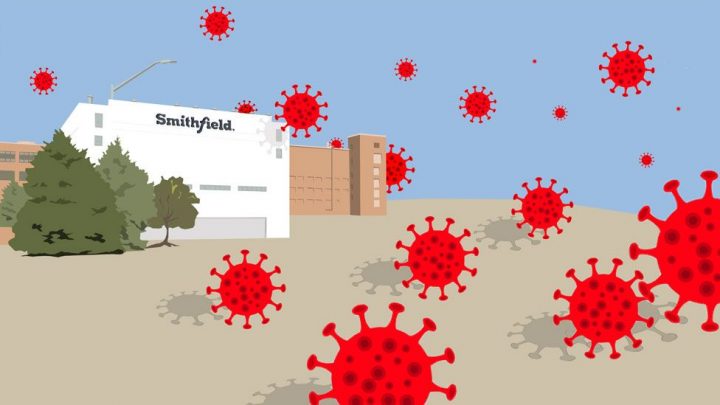
How did the biggest cluster in the US emerge in a corner of South Dakota? Infections spread like wildfire through a pork factory and questions remain about what the company did to protect staff.
On the afternoon of 25 March, Julia sat down at her laptop and logged into a phony Facebook account. She’d opened it in middle school, to surreptitiously monitor boys she had crushes on. But now, many years later, it was about to serve a much more serious purpose.
“Can you please look into Smithfield,” she typed in a message to an account called Argus911, the Facebook-based tip line for the local newspaper, the Argus Leader. “They do have a positive [Covid-19] case and are planning to stay open.” By “Smithfield”, she was referring to the Smithfield Foods pork-processing plant located in her town of Sioux Falls, South Dakota. The factory – a massive, eight-story white box perched on the banks of the Big Sioux River – is the ninth-largest hog-processing facility in the US. When running at full capacity, it processes 19,500 freshly-slaughtered hogs per day, slicing, grinding and smoking them into millions of pounds of bacon, hot dogs and spiral-cut hams. With 3,700 workers, it is also the fourth-largest employer in the city.
Pride of Lions Nap on Road in South Africa
Date – 17/04/2020
Author / Reference – https://www.news18.com/news/buzz/pride-of-lions-nap-on-road-in-south-africa-as-coronavirus-kills-traffic-2581561.html

One of the happiest pictures of animals living a carefree life is coming from a national park in South Africa, even as COVID-19 continues to keep humans at bay.
The official twitter handle of Kruger National Park has shared a glimpse of a pride of lions sleeping peacefully on a road as humans remain locked in their homes.
“Kruger visitors that tourists do not normally see. #SALockdown This lion pride is usually resident on Kempiana Contractual Park, an area that Kruger tourists do not see. This afternoon they were lying on the tar road just outside of Orpen Rest Camp,”.
Saving the whales
Date – 17/04/2020
Author / Reference – https://wwf.panda.org/?199987/Saving-the-whales
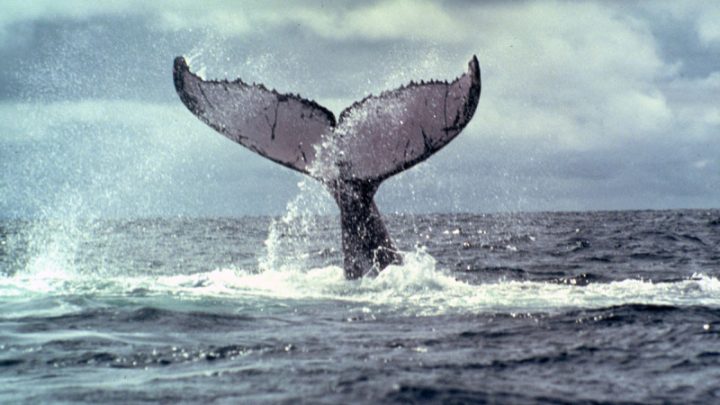
“Save the Whales,” in which we played a key part, is one of the best-known and most successful conservation campaigns ever in the huge awareness and public participation generated and the achievement of effective conservation results. It eventually led to a global moratorium on commercial whaling, which came into effect in 1986.
But although there is a ban on commercial whaling, some governments have bent the rules by killing whales for “scientific research” – with the meat from these “scientific” catches going straight to the supermarket. Around 1,000 whales are killed for “scientific research” annually.
We strongly oppose this, and are fighting to help devastated whale populations to recover.
Virtually the whole of the Southern Ocean – a vital whale habitat – was declared a whale sanctuary in 1994, thanks to the lobbying efforts of WWF and many other organizations. Today, the Southern Ocean sanctuary links to another whale sanctuary in the Indian Ocean. However, much work is still needed to clamp down on unmanaged “scientific” whaling which still occurs in the Southern Ocean Sanctuary.
In the late 1990s we helped convince the governments of France, Italy and Monaco to create the Ligurian whale sanctuary. It covers 80,000 sq km between the coasts of northern Corsica, northwest Italy and southwest France.
This Friendship Between Bear And Man Is Still Going Strong
Date – 17/04/2020
Author / Reference – Lisa Capretto / https://www.huffpost.com/entry/friendship-between-bear-and-man_n_55de07e9e4b08cd3359e5463
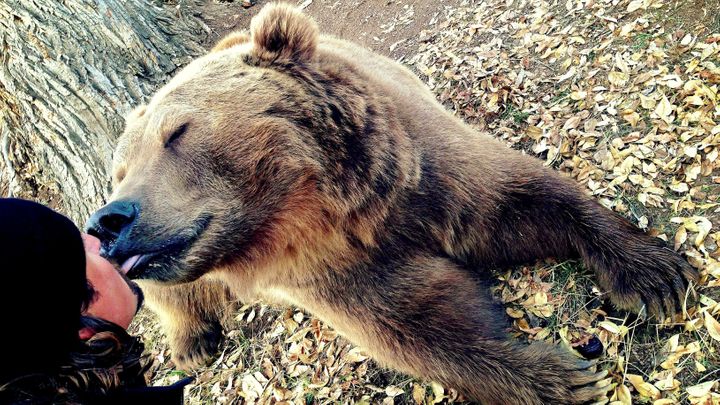
When most men get married, they choose a sibling, a childhood buddy, an old roommate or similarly close friend to stand up in the wedding as their best man. Casey Anderson chose a bear named Brutus.
Brutus has been Casey’s best friend ever since Casey rescued him from being euthanized at an overcrowded wildlife park when Brutus was just 5 months old. That’s also when Casey founded the Montana Grizzly Encounter, an educational sanctuary where Brutus grew up. There, Brutus and Casey developed a deep emotional bond that Casey later described to “The Oprah Winfrey Show” in 2009.
“This connection goes beyond just taking care of Brutus,” Casey told Oprah back then. “They’re very, very emotional animals… When he was a little baby, I was bottle-feeding him and I looked down in his eyes. He had a little tear in his eye. I just kind of chalked it up to [him] straining as he was sucking down the bottle. Several years later, Brutus got a bit of a bellyache. In his eyes, he had the same tear. At that moment, I realized that grizzly bears can feel the same emotions we do.”
Not only does Casey believe that Brutus experiences emotion, but he also told Oprah that his best friend can also sense — and react — when Casey is upset as well.
“I was having a hard time, was really upset about some things… I was crying,” Casey said. “I could see that he wanted to take the pain away from me. He came up to me very gently and nudged me. He just stood by me unconditionally and he listened to me and he was there when I was crying. It’s truly what I needed from him. This relationship is a give-and-take.”
Coronavirus: Tiger at Bronx Zoo tests positive for Covid-19
Date – 17/04/2020
Author / Reference
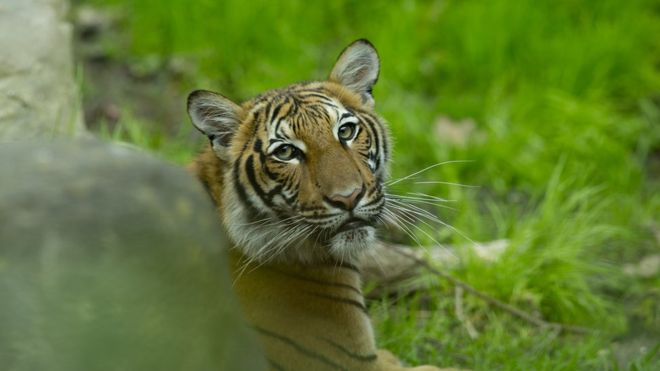
A four-year-old female Malayan tiger at the Bronx Zoo has tested positive for the coronavirus.
The tiger, named Nadia, is believed to be the first known case of an animal infected with Covid-19 in the US.
The Bronx Zoo, in New York City, says the test result was confirmed by the National Veterinary Services Laboratory in Iowa.
Nadia, along with six other big cats, is thought to have been infected by an asymptomatic zoo keeper.
The cats started showing symptoms, including a dry cough, late last month after exposure to the employee, who has not been identified.
“This is the first time that any of us know of anywhere in the world that a person infected the animal and the animal got sick,” Paul Calle, the chief veterinarian at the zoo, told Reuters news agency on Sunday.
There have been isolated instances of pets testing positive for the coronavirus elsewhere in the world, but experts have stressed there is no evidence they can become sick or spread the disease.
Mr Calle said he intends to share the findings with other zoos and institutions researching the transmission of Covid-19.
Coronavirus: Putting the spotlight on the global wildlife trade
Date – 17/04/2020
Author / Reference
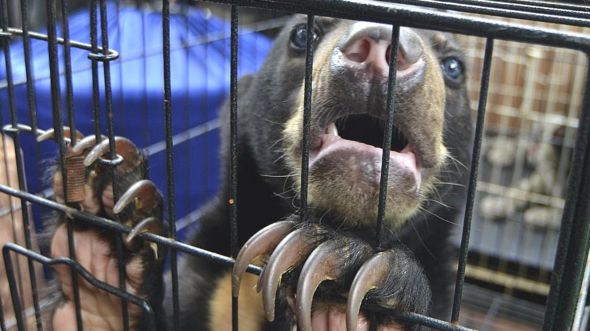
Conservation experts say the coronavirus pandemic, which likely originated at a market selling wild animals in China, is a watershed moment for curbing the global wildlife trade, which can drive extinction and spread disease.
When Adam Peyman walked into a restaurant in Vietnam to order a meal he was shocked to find wild animals, including threatened species, on the menu, alongside traditional rice, noodles and seafood. Sting ray, porcupine, softshell turtle, wild pig and wild goat were all on offer.
“It was a bit of a surprise to see these foods,” says the wildlife manager for the animal welfare organisation, Humane Society International. “But, these kinds of wild foods are considered something of a luxury.”
Feasting on exotic game has become a sign of status and wealth in some Asian countries. The desire for wildlife as food or medicine drives a trade in wild animals, some procured illegally, creating a breeding ground for disease and the chance for viruses to leap to humans.
Indonesia covers up to protect orangutans from virus
Date – 17/04/2020
Author / Reference –
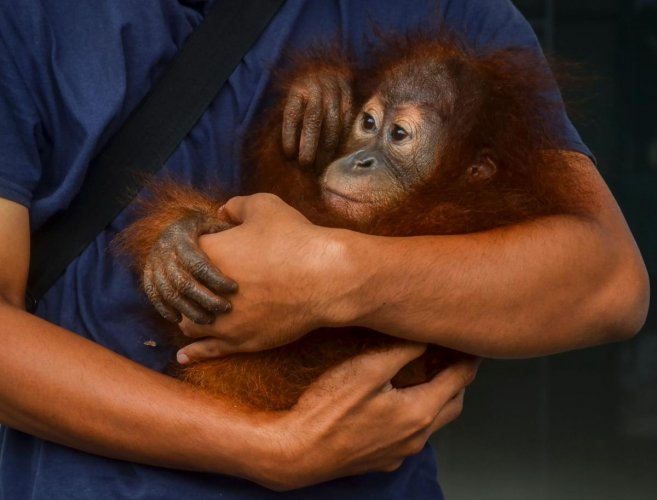
Poaching and habitat loss have decimated Indonesia’s orangutan population, but now coronavirus has emerged as another potential deadly threat to the critically endangered species.
While there have been no confirmed cases of transmission from humans to the fuzzy-haired apes, they share 97 percent of our DNA. And staff at a rehabilitation centre in jungle-covered Borneo are not taking any chances. The Borneo Orangutan Survival.
